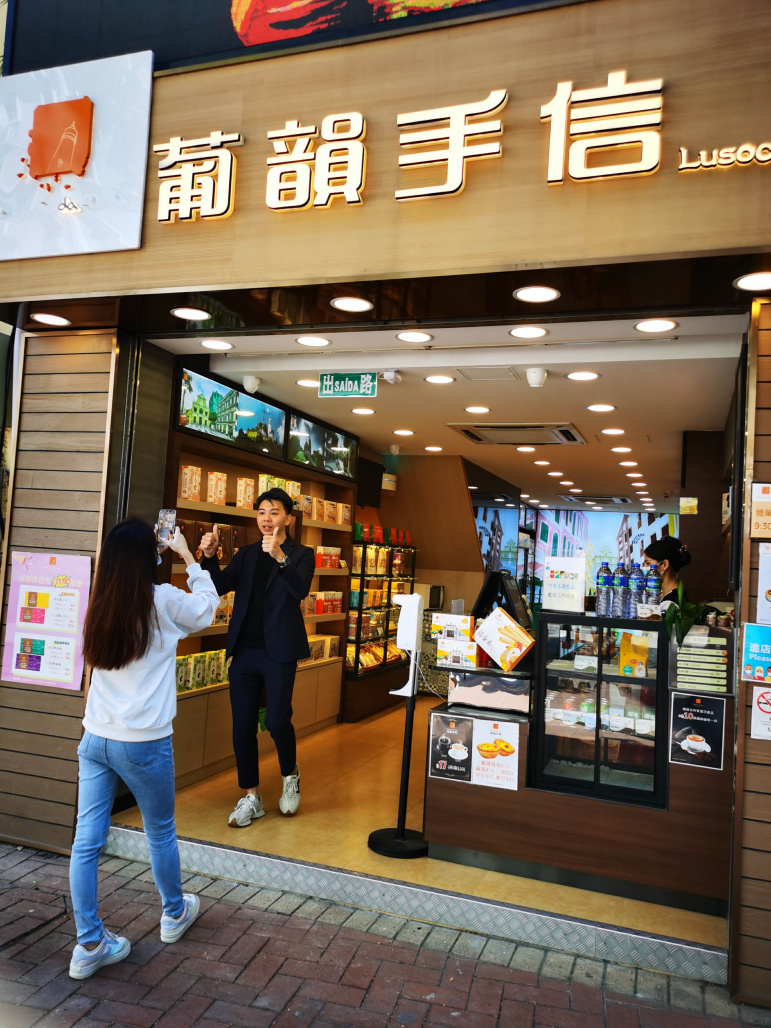Helping generate RMB100 million in sales of Macau products on Mainland Chinese e-commerce platforms via live streaming last year, the recently inaugurated project Macau Live Stream Station (MBU) aims to further help local merchants and brands “e-commercialise” their products so as to seize opportunities across the border.
RMB3.1 trillion
– Forecasted revenue of live streaming e-commerce in Mainland China in 2022
As local tourism is still far from its pre–COVID-19 level, when over 30 million travellers visited the city a year, local merchants have sought alternatives to look for customers and stay afloat. One of the avenues local businesses have strived to explore since the pandemic outbreak two years ago is live streaming e-commerce, which has already been on the rise across the border in recent years.
With the purposes of expediting the local development of live streaming e-commerce and better connecting local businesses with consumers in Mainland China, the Macau Live Stream Station (MBU) was inaugurated last April as a collaboration among Multinational Holdings Group, headed by prominent local businessman Lao Nga Wong; Macau Buyers Development Company Ltd; and Mainland Chinese e-commerce giant Alibaba Group.
Apart from providing a physical space of 5,000 square feet in the city for live streams — promoting products and services via live videos on e-commerce platforms like Taobao and Tmall under Alibaba — MBU also helps local brands to “e-commercialise” their products. “As many Macau merchants only have physical stores, we teach them first how to set up a store on e-commerce platforms,” said Juli Chu, CEO of MBU, in an interview. “Without a store on e-commerce platforms, consumers cannot not place any orders even if the products have been promoted on live streams.”
“We also teach them how to determine the pricing of the products to be put on the e-commerce platforms, and make appealing photos, videos and descriptions of the products to attract [Mainland] customers, as well as storage and logistics procedures [of cross-border e-commerce],” Ms. Chu continued.
Understanding that not every Macau business has the resources to set up their own e-commerce store and team, MBU also runs the so-called “100 Stores in Macau” in Taobao, which handles all the relevant e-commerce procedures. “They just need to provide information about their products to us and send the products to customers when an order has been placed,” Ms. Chu explained.


Connecting bridge
MBU is now providing services for some 40 local brands and merchants, including bakery chain Padaria da Guia, jewellery chain Seng Fung Jewellery, and food souvenir brand Kam In. Besides products, live streamers are also an essential element in this new business model. MBU has signed cooperation pacts with 82 streamers from the Mainland to promote products from the city. “We serve like a platform bridging Macau firms and brands with live streamers on the Mainland,” Ms Chu explained.
In operation for less than a year, MBU has already achieved some results. The sales generated from live streaming sessions about Macau products undertaken by MBU-linked streamers reached over RMB100 million last year, including RMB88 million during the one-month Macau Live Streaming Festival. The event was held between July and August 2021 as a collaboration among Taobao, MBU and the Macau Youth Entrepreneur Association to advance the local development of live streaming.
Ms Chu thinks the result was acceptable as the Live Stream Station has only gotten off the ground for about half a year. “Though the operation was established last April, it took us some time to get ourselves ready,” she said. “And only a small number of local businesses have joined us so far… [The result] could further grow when more join us.”
“We serve like a platform bridging Macau firms and brands with live streamers in the Mainland,” said the CEO of MBU.

Rising trend
MBU’s initial results were indeed the tip of the iceberg when it comes to how popular live streaming e-commerce is in the Mainland right now. Though live streaming focussed on the fields of video gaming and entertainment in the beginning — and it still rings true for many Western countries — the element of e-commerce has been incorporated into streaming sessions in the Mainland in recent years, with this new e-commerce tool gaining traction in 2016, according to Chinese state-run news agency Xinhua.
A new way for firms and merchants to raise brand exposure and move their inventory, given an Internet population of over 900 million across the border, the live-streaming e-commerce segment on the Mainland generated RMB1.09 trillion in the first half of 2021, expanding 18.6 per cent year-on-year and accounting for one-sixth of the total turnover of RMB6.11 trillion in the e-commerce market over the same time period, according to a recent research report published by Fastdata, a Mainland-based data analysis and service provider. Another Mainland-based research institution, Forward, also forecasted in a recent report that live streaming e-commerce could reach RMB3.1 trillion across the border in 2022, compared with just RMB16.8 billion in 2017, and might grow further to RMB6.42 trillion by 2025.
Sole Destination
Involved in the e-commerce segment for more than a decade, Ms Chu said that MBU was set up in the territory due to the rise of opportunities in the post-pandemic era. “Live streaming e-commerce was basically non-existent in the territory before 2020,” she remarked.
Ever since the COVID-19 outbreak two years ago, many popular Chinese streamers abroad have returned to their home country and have not been able to carry out live streaming abroad anymore. Given that Macau has remained as the only tourist destination outside the Mainland that the mainlanders could visit without quarantine arrangements as of now, Ms. Chu organised a visit to the city for about 10 mainland streamers in November 2020. Those streamers successfully generated a turnover of RMB13 million for live streams of Macau products in three days — the results that were acknowledged by Alibaba and the Macau administration, the latter having been looking for means to help local businesses tap the Mainland market. “In view of these circumstances, as well as the fact that the pandemic might still linger, we’ve decided to set up MBU,” Ms Chu said.
The Macau authorities have indeed supported and sponsored various e-commerce and live-streaming initiatives in the past two years, for instance, the Economic and Technological Development Bureau (DSEDT) organised seminars last year for local small and medium-sized enterprises to know more about these new business tools. In an event about a new cross-border e-commerce project in December, Chan Tze Wai, Deputy Director of DSEDT, remarked that e-commerce could inject new momentum into the local economic recovery, and that the authorities would work with stakeholders to support a wide array of e-commerce initiatives and help local SMEs tap the newly available opportunities in the Mainland market.
“Macau alone is already a brand … and the Mainland consumers think the quality of products from Macau is guaranteed,” said Juli Chu of MBU.

Marketing matters
Concerning how Macau products could stand out in the Mainland market, the MBU CEO noted: “Macau alone is already a brand … and the Mainland consumers think the quality of products from Macau is guaranteed.”
The key for Macau brands to promote products on the Mainland via live streaming or e-commerce is identifying the selling point of their products. “With years of experience in e-commerce, I think it’s not really about what types of product the consumers favour, but what products the companies have promoted and how they have promoted them,” Ms Chu said. “The companies have to be prepared to conduct e-commerce and live streaming, choose what types of products [to be put on e-commerce platforms], and prepare and implement marketing strategies.”
For local companies interested in exploring the Mainland market via live streaming e-commerce, she advises them to make sure they can manage their expectations. “It takes time for the e-commerce business to grow, just like with brick-and-mortar stores,” she said. “Don’t expect to generate a million dollars in sales and have a red-hot product a day after a live stream.”
“It takes time for the e-commerce business to grow, just like with brick-and-mortar stores,” MBU’s Juli Chu said. “Don’t expect to generate a million dollars in sales and have a red-hot product a day after a live stream.”

Nurturing local streamers
The Stream Station now has two local streamers, who conduct live streams four hours a day and five days a week. “They also visit different physical stores of Macau brands on a regular basis to help them promote their offerings,” Ms Chu said, adding that each now has about 10,000 followers with several thousands of people watching their streams each time.
“They have made a video for a local eatery … which has generated over 700,000 views in a week … and the best result they have so far was sales of over RMB20,000 in one streaming session,” she pointed out.
And MBU will also focus its efforts on the cultivation of more local streamers this year. The Stream Station has organised an experience camp for residents every week to have a taste of the life of streamers since the start of 2022, plus a contest for upcoming local streamers scheduled for later this year. The MBU team also worked with the Macau Goldsmiths’ Guild last year to provide live-streaming training for 24 sales representatives of local jewellers, who would carry out live streams regularly on e-commerce platforms for their stores.
“In the mainland, streamers usually broadcast live every day and about six to eight hour a day — their schedule and nature of work are actually similar to what sales representatives of brick-and-mortar stores do,” Ms. Chu highlighted.
Whether local businesses want to venture into the e-commerce segment or local residents plan to become streamers, she believes it is important for them to take a first step and persevere. “It takes time,” she reiterated.


























